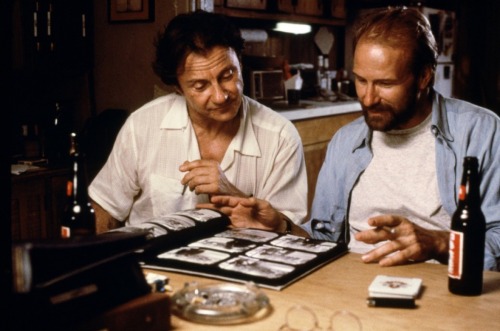
A scene from Wayne Wang’s Smoke. Have you been looking at old photos, too?
Have you been doing lots of things you haven’t felt like doing before? I have. Apparently a lot of people are baking bread, and I’m trying to work up the courage to make some New York rye. Baking is not my thing, but I found a recipe for making rye bread with pickle juice – that sounds irresistable.
I’ve also been listening to audiobooks, not because I prefer them but because the library in closed during this pandemic and only ebooks and downloadable audiobooks books are available.
On Mother’s Day, I did a lot of looking at old photos. My bet is a lot of people did the same.
Life since the end of February has been a bit disjointed, with old patterns flying out the window and new patterns flying in, then the new ones sneaking out, replaced by others sneaking in, then those new ones sneaking out and…well, you get my drift. Are you feeling like the “pattern” during our Stay Home, Stay Safe pandemic seems to be no pattern at all? Is that a good thing or bad thing? Who knows? (she says, shrugging her shoulders….)
My thoughts are a little scattered, possibly becauset the boundaries of my world are now more restricted. There are lots of new rules. But how can a day be simultaneously “More of the same” and “Everything’s different”? I’m confused. What’s new? (she says, shrugging her shoulders….)
As writers we’re used to being at home when we work. But we’re not used to the whole neighborhood, town, county, state, country staying home. It’s more than eerie – it’s serious business. True, change presents opportunities as long as we’re healthy. There’s space for innovation, creativity, new choices. There is also space for insomnia because we feel a sea change coming, and we know the pandemic is no metaphor, it’s real, it’s out there.
Like I said, life’s been disjointed – could be a chance for change, could be a mess, most likely both. Whatever is coming, the present passes a bit more slowly in ways I can’t quite figure out. Same for you? Despite the slow pace, does your day end without you being able to figure out what you did all day – how did you get from morning to night? In some ways, does life seem to be in slow-motion? Or even no-motion?
Of course, slowing down has always been something I’ve recommended to my creative writing students. Good writing – especially poetry, as far as I’m concerned – requires it. “You’ll never get it if you don’t slow down, my friend” – that’s a line from Wayne Wang’s fascinating movie, Smoke, which I also recommended to my students. It’s based on a book by Paul Auster, who also wrote the screenplay. Auggie, played by Harvey Keitel, has scrapbooks full of snapshots of his smoke shop in Brooklyn, and when he shares the scrapbooks with a friend (see the photo above) the friend points out that all the photos look the same. But Auggie disagrees. On the surface, yes, the photos seem identical. But his smoke shop, his “little spot” in the world, is different every day, if you know how to look carefully. Different people pass by, or the same people pass by but they look different from the day before. The air each day is different, the light is different, the weather and the seasons are different, colors, noises, conversations, the details are different.

So I’m living in my little corner of a Smoke world right now. The same each day but different. Forget-me-nots blooming, carrots coming up in the raised bed, chickadees building a nest in a wooden birdhouse. The white lilac has come into its glory and is about to go out of it, as it does each year.
My grandson turned thirteen yesterday. I love him to the moon and back, and I can’t imagine being thirteen, even though I once was. When I go for my walk later today, I’ll try to remember what being thirteen was like. And when I go to bed, I’ll still be trying, because I like to get the details right. I remember slowly. I might fall asleep thinking about that, or I might be thinking about taking weekly photos of my little yellow house because it’s the same but different every day. Or I might fall asleep thinking about the word “disjointed.” It’s a word that makes you believe your skeleton could be rearranged so your knee bones switch places with your wrists. Or the knuckles of your thumbs get attached to your ankles. “Dis-jointed.” I’m sure there’s a poem in that somewhere.














 You can’t help but imagine their lives as revealed by their homes. It’s an interesting insight, especially for we nosy writer-types.
You can’t help but imagine their lives as revealed by their homes. It’s an interesting insight, especially for we nosy writer-types.


































